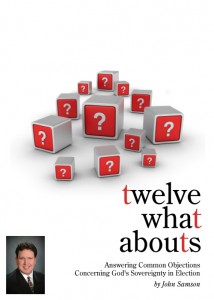 Chapter 7 of my book, “Twelve What Abouts – Answering Common Objections Concerning God’s Sovereignty in Election.”
Chapter 7 of my book, “Twelve What Abouts – Answering Common Objections Concerning God’s Sovereignty in Election.”
What about Foreknowledge?
Romans 8:28-30: And we know that for those who love God all things work together for good, for those who are called according to his purpose. For those whom he foreknew he also predestined to be conformed to the image of his Son, in order that he might be the firstborn among many brothers. And those whom he predestined he also called, and those whom he called he also justified, and those whom he justified he also glorified.
In what theologians refer to as “The Golden Chain of Redemption,” God is revealing to us an unbreakable chain that starts in eternity past, goes through time, and on into eternity future. This chain is forged by God Himself, and has five unbreakable links: God foreknows, predestinates, calls, justifies and glorifies.
Notice that there is one ambiguity in the text; something that is not actually stated but is definitely implied – that being the word “all.” Let’s see this clearly by inserting another possible implication by way of contrast, the word “some.”
“For (some) whom He foreknew, He predestined; (some) He predestined, He called; (some) He called, He justified; and (some) He justified, were glorified.” What kind of comfort and security would that give to us? Would we be able to say “Who can separate us from the love of Christ?”
I think our answer would have to be that many things could separate us (if the intended implication was the word “some” in this passage). It would make absolutely no sense whatsoever and certainly would not give us any kind of security in Christ, the very thing Paul is seeking to do in this Romans 8 passage.
I believe 100 out of 100 Bible scholars would all agree that the implication of the text is that all He foreknew, He predestined; all He predestined, He called; all He called, He justified; and all He justified, He glorified.
FOR THOSE WHOM HE FOREKNEW…
In Romans 8:29, the text reads “For those whom he foreknew, he also predestined to become conformed to the image of His Son…”
Does this not therefore suggest that because foreknowledge comes before predestination in the text, then predestination is simply based on God’s foreknowledge? In other words, because God foreknows or sees in advance (with full and complete knowledge) what a person will do, and who it is that will respond in faith to the Gospel, He simply predestinates those whom He knows will believe. Right?
Certainly this is how I understood this passage for many years and it is the way that many deal with the issue of predestination in our day.
I also pointed to 1 Peter 1:1-2 which talks of those who are “elect … according to the foreknowledge of God the Father…” and assumed that this verse would add weight to my argument that election and predestination is based on God knowing ahead of time what we will do.
At first glance, it certainly seems to be a legitimate interpretation, because the word “foreknew” comes before “predestination” in the text of Romans 8:29.
However, the fact that foreknowledge comes before predestination should in no way surprise us. That’s because God would need to foreknow a person He is going to predestinate to something. God does not predestinate unknown persons, but specific individuals whom He knows.
So this is not really an argument for either side in this debate. In both systems, foreknowing would need to come before predestination.
The real question then is, “What exactly does it mean for God to foreknow somebody?” Continue reading →

 Chapter 7 of my book, “Twelve What Abouts – Answering Common Objections Concerning God’s Sovereignty in Election.”
Chapter 7 of my book, “Twelve What Abouts – Answering Common Objections Concerning God’s Sovereignty in Election.”